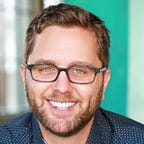DP(E): Bill Gates and Rashida Jones ask big questions —Episode 4: Is it too late to stop climate change?
This conversation series between Rashida Jones—actress, producer, daughter of the legendary Quincy Jones, and Harvard alum—and Bill Gates—well, Bill Gates—has been pretty great all around. The format allows for more talk between the two of them as co-hosts than other formats, and they bring in (thus far) one to two guests per episode. The guest(s) is a deep subject matter or highly contemporaneous to the given subject. The first three episodes had NAID director Anthony Fauci, author & professor Yuval Harari, economist Raj Chetty, Bono, Compton mayor Aja Brown, and actress Kerry Washington—a knockout guest list to be sure. The series is produced by Bill’s foundation and is clearly designed to foster discussions on these key issues. I love that Rashida is his co-host, as she’s highly liked by television audiences, is a connector of people across entertainment, and is herself a deep thinker. It’s a recipe that, at the least, won’t fall on its face.
This particular episode they go deep into climate change, with their Pulitzer Prize-winning guest, Elizabeth Kolbert, author of The Sixth Extinction: An Unnatural History. Kolbert doesn’t play as key of a role in the conversation as some of her predecessor guests on the show, but she does recap her book in a way that’s likely helpful to this podcast audience.
My favorite part of the show though, was the progression the Gates Foundation went through to net out on prioritizing climate change efforts. It was a very linear train of thought, which strikes me as very Gates-like. It goes something like: “I want African countries to all have reliable access to electricity. Electricity will facilitate clean water access, will enable job growth, will bring African countries on par with their developed nation peers. Generating a bunch of electricity via traditional coal burning techniques will likely contribute to carbon in the atmosphere. That carbon contribution will accelerate other problems that’ll challenge Africa—desertification, rising coastal waters. That isn’t good. I still want Africa to get electricity. Let’s make generating electricity better for the world.” Point to point to point in a clean causal, linear fashion.
Resources:
- Episode show notes & stream link.
- Pre-order Bill Gates’s book “How to Avoid a Climate Disaster: The Solutions We Have and the Breakthroughs We Need” on Amazon
